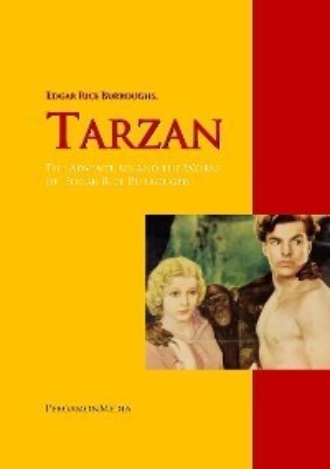
Полная версия
Tarzan: The Adventures and the Works of Edgar Rice Burroughs
His reverie was broken in upon by the voice of a sentry summoning a non-commissioned officer. Captain Jacot raised his eyes. The sun had not yet set; but the shadows of the few trees huddled about the water hole and of his men and their horses stretched far away into the east across the now golden sand. The sentry was pointing in this direction, and the corporal, through narrowed lids, was searching the distance. Captain Jacot rose to his feet. He was not a man content to see through the eyes of others. He must see for himself. Usually he saw things long before others were aware that there was anything to see—a trait that had won for him the sobriquet of Hawk. Now he saw, just beyond the long shadows, a dozen specks rising and falling among the sands. They disappeared and reappeared, but always they grew larger. Jacot recognized them immediately. They were horsemen—horsemen of the desert. Already a sergeant was running toward him. The entire camp was straining its eyes into the distance. Jacot gave a few terse orders to the sergeant who saluted, turned upon his heel and returned to the men. Here he gathered a dozen who saddled their horses, mounted and rode out to meet the strangers. The remaining men disposed themselves in readiness for instant action. It was not entirely beyond the range of possibilities that the horsemen riding thus swiftly toward the camp might be friends of the prisoners bent upon the release of their kinsmen by a sudden attack. Jacot doubted this, however, since the strangers were evidently making no attempt to conceal their presence. They were galloping rapidly toward the camp in plain view of all. There might be treachery lurking beneath their fair appearance; but none who knew The Hawk would be so gullible as to hope to trap him thus.
The sergeant with his detail met the Arabs two hundred yards from the camp. Jacot could see him in conversation with a tall, white-robed figure—evidently the leader of the band. Presently the sergeant and this Arab rode side by side toward camp. Jacot awaited them. The two reined in and dismounted before him.
"Sheik Amor ben Khatour," announced the sergeant by way of introduction.
Captain Jacot eyed the newcomer. He was acquainted with nearly every principal Arab within a radius of several hundred miles. This man he never had seen. He was a tall, weather beaten, sour looking man of sixty or more. His eyes were narrow and evil. Captain Jacot did not relish his appearance.
"Well?" he asked, tentatively.
The Arab came directly to the point.
"Achmet ben Houdin is my sister's son," he said. "If you will give him into my keeping I will see that he sins no more against the laws of the French."
Jacot shook his head. "That cannot be," he replied. "I must take him back with me. He will be properly and fairly tried by a civil court. If he is innocent he will be released."
"And if he is not innocent?" asked the Arab.
"He is charged with many murders. For any one of these, if he is proved guilty, he will have to die."
The Arab's left hand was hidden beneath his burnous. Now he withdrew it disclosing a large goatskin purse, bulging and heavy with coins. He opened the mouth of the purse and let a handful of the contents trickle into the palm of his right hand—all were pieces of good French gold. From the size of the purse and its bulging proportions Captain Jacot concluded that it must contain a small fortune. Sheik Amor ben Khatour dropped the spilled gold pieces one by one back into the purse. Jacot was eyeing him narrowly. They were alone. The sergeant, having introduced the visitor, had withdrawn to some little distance—his back was toward them. Now the sheik, having returned all the gold pieces, held the bulging purse outward upon his open palm toward Captain Jacot.
"Achmet ben Houdin, my sister's son, MIGHT escape tonight," he said. "Eh?"
Captain Armand Jacot flushed to the roots of his close-cropped hair. Then he went very white and took a half-step toward the Arab. His fists were clenched. Suddenly he thought better of whatever impulse was moving him.
"Sergeant!" he called. The non-commissioned officer hurried toward him, saluting as his heels clicked together before his superior.
"Take this black dog back to his people," he ordered. "See that they leave at once. Shoot the first man who comes within range of camp tonight."
Sheik Amor ben Khatour drew himself up to his full height. His evil eyes narrowed. He raised the bag of gold level with the eyes of the French officer.
"You will pay more than this for the life of Achmet ben Houdin, my sister's son," he said. "And as much again for the name that you have called me and a hundred fold in sorrow in the bargain."
"Get out of here!" growled Captain Armand Jacot, "before I kick you out."
All of this happened some three years before the opening of this tale. The trail of Achmet ben Houdin and his accomplices is a matter of record—you may verify it if you care to. He met the death he deserved, and he met it with the stoicism of the Arab.
A month later little Jeanne Jacot, the seven-year-old daughter of Captain Armand Jacot, mysteriously disappeared. Neither the wealth of her father and mother, or all the powerful resources of the great republic were able to wrest the secret of her whereabouts from the inscrutable desert that had swallowed her and her abductor.
A reward of such enormous proportions was offered that many adventurers were attracted to the hunt. This was no case for the modern detective of civilization, yet several of these threw themselves into the search—the bones of some are already bleaching beneath the African sun upon the silent sands of the Sahara.
Two Swedes, Carl Jenssen and Sven Malbihn, after three years of following false leads at last gave up the search far to the south of the Sahara to turn their attention to the more profitable business of ivory poaching. In a great district they were already known for their relentless cruelty and their greed for ivory. The natives feared and hated them. The European governments in whose possessions they worked had long sought them; but, working their way slowly out of the north they had learned many things in the no-man's-land south of the Sahara which gave them immunity from capture through easy avenues of escape that were unknown to those who pursued them. Their raids were sudden and swift. They seized ivory and retreated into the trackless wastes of the north before the guardians of the territory they raped could be made aware of their presence. Relentlessly they slaughtered elephants themselves as well as stealing ivory from the natives. Their following consisted of a hundred or more renegade Arabs and Negro slaves—a fierce, relentless band of cut-throats. Remember them—Carl Jenssen and Sven Malbihn, yellow-bearded, Swedish giants—for you will meet them later.
In the heart of the jungle, hidden away upon the banks of a small unexplored tributary of a large river that empties into the Atlantic not so far from the equator, lay a small, heavily palisaded village. Twenty palm-thatched, beehive huts sheltered its black population, while a half-dozen goat skin tents in the center of the clearing housed the score of Arabs who found shelter here while, by trading and raiding, they collected the cargoes which their ships of the desert bore northward twice each year to the market of Timbuktu.
Playing before one of the Arab tents was a little girl of ten—a black-haired, black-eyed little girl who, with her nut-brown skin and graceful carriage looked every inch a daughter of the desert. Her little fingers were busily engaged in fashioning a skirt of grasses for a much-disheveled doll which a kindly disposed slave had made for her a year or two before. The head of the doll was rudely chipped from ivory, while the body was a rat skin stuffed with grass. The arms and legs were bits of wood, perforated at one end and sewn to the rat skin torso. The doll was quite hideous and altogether disreputable and soiled, but Meriem thought it the most beautiful and adorable thing in the whole world, which is not so strange in view of the fact that it was the only object within that world upon which she might bestow her confidence and her love.
Everyone else with whom Meriem came in contact was, almost without exception, either indifferent to her or cruel. There was, for example, the old black hag who looked after her, Mabunu—toothless, filthy and ill tempered. She lost no opportunity to cuff the little girl, or even inflict minor tortures upon her, such as pinching, or, as she had twice done, searing the tender flesh with hot coals. And there was The Sheik, her father. She feared him more than she did Mabunu. He often scolded her for nothing, quite habitually terminating his tirades by cruelly beating her, until her little body was black and blue.
But when she was alone she was happy, playing with Geeka, or decking her hair with wild flowers, or making ropes of grasses. She was always busy and always singing—when they left her alone. No amount of cruelty appeared sufficient to crush the innate happiness and sweetness from her full little heart. Only when The Sheik was near was she quiet and subdued. Him she feared with a fear that was at times almost hysterical terror. She feared the gloomy jungle too—the cruel jungle that surrounded the little village with chattering monkeys and screaming birds by day and the roaring and coughing and moaning of the carnivora by night. Yes, she feared the jungle; but so much more did she fear The Sheik that many times it was in her childish head to run away, out into the terrible jungle forever rather than longer to face the ever present terror of her father.
As she sat there this day before The Sheik's goatskin tent, fashioning a skirt of grasses for Geeka, The Sheik appeared suddenly approaching. Instantly the look of happiness faded from the child's face. She shrunk aside in an attempt to scramble from the path of the leathern-faced old Arab; but she was not quick enough. With a brutal kick the man sent her sprawling upon her face, where she lay quite still, tearless but trembling. Then, with an oath at her, the man passed into the tent. The old, black hag shook with appreciative laughter, disclosing an occasional and lonesome yellow fang.
When she was sure The Sheik had gone, the little girl crawled to the shady side of the tent, where she lay quite still, hugging Geeka close to her breast, her little form racked at long intervals with choking sobs. She dared not cry aloud, since that would have brought The Sheik upon her again. The anguish in her little heart was not alone the anguish of physical pain; but that infinitely more pathetic anguish—of love denied a childish heart that yearns for love.
Little Meriem could scarce recall any other existence than that of the stern cruelty of The Sheik and Mabunu. Dimly, in the back of her childish memory there lurked a blurred recollection of a gentle mother; but Meriem was not sure but that even this was but a dream picture induced by her own desire for the caresses she never received, but which she lavished upon the much loved Geeka. Never was such a spoiled child as Geeka. Its little mother, far from fashioning her own conduct after the example set her by her father and nurse, went to the extreme of indulgence. Geeka was kissed a thousand times a day. There was play in which Geeka was naughty; but the little mother never punished. Instead, she caressed and fondled; her attitude influenced solely by her own pathetic desire for love.
Now, as she pressed Geeka close to her, her sobs lessened gradually, until she was able to control her voice, and pour out her misery into the ivory ear of her only confidante.
"Geeka loves Meriem," she whispered. "Why does The Sheik, my father, not love me, too? Am I so naughty? I try to be good; but I never know why he strikes me, so I cannot tell what I have done which displeases him. Just now he kicked me and hurt me so, Geeka; but I was only sitting before the tent making a skirt for you. That must be wicked, or he would not have kicked me for it. But why is it wicked, Geeka? Oh dear! I do not know, I do not know. I wish, Geeka, that I were dead. Yesterday the hunters brought in the body of El Adrea. El Adrea was quite dead. No more will he slink silently upon his unsuspecting prey. No more will his great head and his maned shoulders strike terror to the hearts of the grass eaters at the drinking ford by night. No more will his thundering roar shake the ground. El Adrea is dead. They beat his body terribly when it was brought into the village; but El Adrea did not mind. He did not feel the blows, for he was dead. When I am dead, Geeka, neither shall I feel the blows of Mabunu, or the kicks of The Sheik, my father. Then shall I be happy. Oh, Geeka, how I wish that I were dead!"
If Geeka contemplated a remonstrance it was cut short by sounds of altercation beyond the village gates. Meriem listened. With the curiosity of childhood she would have liked to have run down there and learn what it was that caused the men to talk so loudly. Others of the village were already trooping in the direction of the noise. But Meriem did not dare. The Sheik would be there, doubtless, and if he saw her it would be but another opportunity to abuse her, so Meriem lay still and listened.
Presently she heard the crowd moving up the street toward The Sheik's tent. Cautiously she stuck her little head around the edge of the tent. She could not resist the temptation, for the sameness of the village life was monotonous, and she craved diversion. What she saw was two strangers—white men. They were alone, but as they approached she learned from the talk of the natives that surrounded them that they possessed a considerable following that was camped outside the village. They were coming to palaver with The Sheik.
The old Arab met them at the entrance to his tent. His eyes narrowed wickedly when they had appraised the newcomers. They stopped before him, exchanging greetings. They had come to trade for ivory they said. The Sheik grunted. He had no ivory. Meriem gasped. She knew that in a near-by hut the great tusks were piled almost to the roof. She poked her little head further forward to get a better view of the strangers. How white their skins! How yellow their great beards!
Suddenly one of them turned his eyes in her direction. She tried to dodge back out of sight, for she feared all men; but he saw her. Meriem noticed the look of almost shocked surprise that crossed his face. The Sheik saw it too, and guessed the cause of it.
"I have no ivory," he repeated. "I do not wish to trade. Go away. Go now."
He stepped from his tent and almost pushed the strangers about in the direction of the gates. They demurred, and then The Sheik threatened. It would have been suicide to have disobeyed, so the two men turned and left the village, making their way immediately to their own camp.
The Sheik returned to his tent; but he did not enter it. Instead he walked to the side where little Meriem lay close to the goat skin wall, very frightened. The Sheik stooped and clutched her by the arm. Viciously he jerked her to her feet, dragged her to the entrance of the tent, and shoved her viciously within. Following her he again seized her, beating her ruthlessly.
"Stay within!" he growled. "Never let the strangers see thy face. Next time you show yourself to strangers I shall kill you!"
With a final vicious cuff he knocked the child into a far corner of the tent, where she lay stifling her moans, while The Sheik paced to and fro muttering to himself. At the entrance sat Mabunu, muttering and chuckling.
In the camp of the strangers one was speaking rapidly to the other.
"There is no doubt of it, Malbihn," he was saying. "Not the slightest; but why the old scoundrel hasn't claimed the reward long since is what puzzles me."
"There are some things dearer to an Arab, Jenssen, than money," returned the first speaker—"revenge is one of them."
"Anyhow it will not harm to try the power of gold," replied Jenssen.
Malbihn shrugged.
"Not on The Sheik," he said. "We might try it on one of his people; but The Sheik will not part with his revenge for gold. To offer it to him would only confirm his suspicions that we must have awakened when we were talking to him before his tent. If we got away with our lives, then, we should be fortunate."
"Well, try bribery, then," assented Jenssen.
But bribery failed—grewsomely. The tool they selected after a stay of several days in their camp outside the village was a tall, old headman of The Sheik's native contingent. He fell to the lure of the shining metal, for he had lived upon the coast and knew the power of gold. He promised to bring them what they craved, late that night.
Immediately after dark the two white men commenced to make arrangements to break camp. By midnight all was prepared. The porters lay beside their loads, ready to swing them aloft at a moment's notice. The armed askaris loitered between the balance of the safari and the Arab village, ready to form a rear guard for the retreat that was to begin the moment that the head man brought that which the white masters awaited.
Presently there came the sound of footsteps along the path from the village. Instantly the askaris and the whites were on the alert. More than a single man was approaching. Jenssen stepped forward and challenged the newcomers in a low whisper.
"Who comes?" he queried.
"Mbeeda," came the reply.
Mbeeda was the name of the traitorous head man. Jenssen was satisfied, though he wondered why Mbeeda had brought others with him. Presently he understood. The thing they fetched lay upon a litter borne by two men. Jenssen cursed beneath his breath. Could the fool be bringing them a corpse? They had paid for a living prize!
The bearers came to a halt before the white men.
"This has your gold purchased," said one of the two. They set the litter down, turned and vanished into the darkness toward the village. Malbihn looked at Jenssen, a crooked smile twisting his lips. The thing upon the litter was covered with a piece of cloth.
"Well?" queried the latter. "Raise the covering and see what you have bought. Much money shall we realize on a corpse—especially after the six months beneath the burning sun that will be consumed in carrying it to its destination!"
"The fool should have known that we desired her alive," grumbled Malbihn, grasping a corner of the cloth and jerking the cover from the thing that lay upon the litter.
At sight of what lay beneath both men stepped back—involuntary oaths upon their lips—for there before them lay the dead body of Mbeeda, the faithless head man.
Five minutes later the safari of Jenssen and Malbihn was forcing its way rapidly toward the west, nervous askaris guarding the rear from the attack they momentarily expected.
Chapter 6
His first night in the jungle was one which the son of Tarzan held longest in his memory. No savage carnivora menaced him. There was never a sign of hideous barbarian. Or, if there were, the boy's troubled mind took no cognizance of them. His conscience was harassed by the thought of his mother's suffering. Self-blame plunged him into the depths of misery. The killing of the American caused him little or no remorse. The fellow had earned his fate. Jack's regret on this score was due mainly to the effect which the death of Condon had had upon his own plans. Now he could not return directly to his parents as he had planned. Fear of the primitive, borderland law, of which he had read highly colored, imaginary tales, had thrust him into the jungle a fugitive. He dared not return to the coast at this point—not that he was so greatly influenced through personal fear as from a desire to shield his father and mother from further sorrow and from the shame of having their honored name dragged through the sordid degradation of a murder trial.
With returning day the boy's spirits rose. With the rising sun rose new hope within his breast. He would return to civilization by another way. None would guess that he had been connected with the killing of the stranger in the little out-of-the-way trading post upon a remote shore.
Crouched close to the great ape in the crotch of a tree the boy had shivered through an almost sleepless night. His light pajamas had been but little protection from the chill dampness of the jungle, and only that side of him which was pressed against the warm body of his shaggy companion approximated to comfort. And so he welcomed the rising sun with its promise of warmth as well as light—the blessed sun, dispeller of physical and mental ills.
He shook Akut into wakefulness.
"Come," he said. "I am cold and hungry. We will search for food, out there in the sunlight," and he pointed to an open plain, dotted with stunted trees and strewn with jagged rock.
The boy slid to the ground as he spoke, but the ape first looked carefully about, sniffing the morning air. Then, satisfied that no danger lurked near, he descended slowly to the ground beside the boy.
"Numa, and Sabor his mate, feast upon those who descend first and look afterward, while those who look first and descend afterward live to feast themselves." Thus the old ape imparted to the son of Tarzan the boy's first lesson in jungle lore. Side by side they set off across the rough plain, for the boy wished first to be warm. The ape showed him the best places to dig for rodents and worms; but the lad only gagged at the thought of devouring the repulsive things. Some eggs they found, and these he sucked raw, as also he ate roots and tubers which Akut unearthed. Beyond the plain and across a low bluff they came upon water—brackish, ill-smelling stuff in a shallow water hole, the sides and bottom of which were trampled by the feet of many beasts. A herd of zebra galloped away as they approached.
The lad was too thirsty by now to cavil at anything even remotely resembling water, so he drank his fill while Akut stood with raised head, alert for any danger. Before the ape drank he cautioned the boy to be watchful; but as he drank he raised his head from time to time to cast a quick glance toward a clump of bushes a hundred yards away upon the opposite side of the water hole. When he had done he rose and spoke to the boy, in the language that was their common heritage—the tongue of the great apes.
"There is no danger near?" he asked.
"None," replied the boy. "I saw nothing move while you drank."
"Your eyes will help you but little in the jungle," said the ape.
"Here, if you would live, you must depend upon your ears and your nose but most upon your nose. When we came down to drink I knew that no danger lurked near upon this side of the water hole, for else the zebras would have discovered it and fled before we came; but upon the other side toward which the wind blows danger might lie concealed. We could not smell it for its scent is being blown in the other direction, and so I bent my ears and eyes down wind where my nose cannot travel."
"And you found—nothing?" asked the lad, with a laugh.
"I found Numa crouching in that clump of bushes where the tall grasses grow," and Akut pointed.
"A lion?" exclaimed the boy. "How do you know? I can see nothing."
"Numa is there, though," replied the great ape. "First I heard him sigh. To you the sigh of Numa may sound no different from the other noises which the wind makes among the grasses and the trees; but later you must learn to know the sigh of Numa. Then I watched and at last I saw the tall grasses moving at one point to a force other than the force of the wind. See, they are spread there upon either side of Numa's great body, and as he breathes—you see? You see the little motion at either side that is not caused by the wind—the motion that none of the other grasses have?"
The boy strained his eyes—better eyes than the ordinary boy inherits—and at last he gave a little exclamation of discovery.
"Yes," he said, "I see. He lies there," and he pointed. "His head is toward us. Is he watching us?"
"Numa is watching us," replied Akut, "but we are in little danger, unless we approach too close, for he is lying upon his kill. His belly is almost full, or we should hear him crunching the bones. He is watching us in silence merely from curiosity. Presently he will resume his feeding or he will rise and come down to the water for a drink. As he neither fears or desires us he will not try to hide his presence from us; but now is an excellent time to learn to know Numa, for you must learn to know him well if you would live long in the jungle. Where the great apes are many Numa leaves us alone. Our fangs are long and strong, and we can fight; but when we are alone and he is hungry we are no match for him. Come, we will circle him and catch his scent. The sooner you learn to know it the better; but keep close to the trees, as we go around him, for Numa often does that which he is least expected to do. And keep your ears and your eyes and your nose open. Remember always that there may be an enemy behind every bush, in every tree and amongst every clump of jungle grass. While you are avoiding Numa do not run into the jaws of Sabor, his mate. Follow me," and Akut set off in a wide circle about the water hole and the crouching lion.






